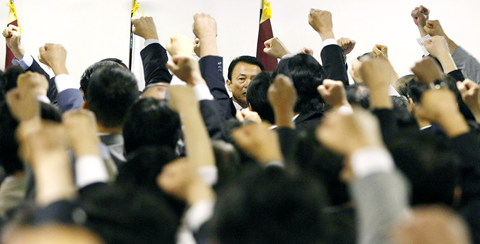Unpopular Japanese Prime Minister Taro Aso dissolved parliament yesterday, paving the way for an election late next month seen as likely to end his party’s more than half-century of almost unbroken rule.
Aso, who is lagging badly in opinion polls and has struggled to quell internal party revolt, offered a rare apology to his conservative Liberal Democratic Party (LDP) lawmakers for the government’s sagging support.
“My statements and what have been characterized as my changing policy positions have led the Japanese people to worry about and grow distrustful of politics,” the gaffe-prone Aso said before the lower house was dissolved.

PHOTO: EPA
“As a result, the approval rating for the Liberal Democratic Party has fallen. I am deeply sorry,” the 68-year-old prime minister said.
Several recent surveys have put support for Aso in the high teens, and most pundits expect the main opposition group, the as yet untested Democratic Party of Japan (DPJ), to win the general election on Aug. 30.
Aso’s LDP lost 4 percentage points to 20 percent from two weeks ago while support for the DPJ rose by six points to 31 percent, according to the latest poll, conducted by the Asahi Shimbun newspaper at the weekend.
A succession of local election defeats, most recently in key Tokyo assembly polls this month, has prompted rebel members of the LDP to try to push Aso out of power so that the party can face the election under a new leader.
Party leaders and Aso allies have tried to ease the internal dispute, and Aso on Tuesday vowed to stay on as party chief, but discontent is simmering among many ruling party lawmakers who are likely to lose their seats.
Aso — a political blueblood from a top industrial family, known for his gruff demeanor — tried his best to rally the troops yesterday.
“My sole wish is that all of our candidates here for the lower house election shall return to this place,” he told lawmakers. “To achieve this goal, there is no other way but to form a united front and fight together.”
The LDP has governed Japan continuously since the party’s foundation in 1955, except for one 10-month stretch in the early 1990s.

LONG FLIGHT: The jets would be flown by US pilots, with Taiwanese copilots in the two-seat F-16D variant to help familiarize them with the aircraft, the source said The US is expected to fly 10 Lockheed Martin F-16C/D Block 70/72 jets to Taiwan over the coming months to fulfill a long-awaited order of 66 aircraft, a defense official said yesterday. Word that the first batch of the jets would be delivered soon was welcome news to Taiwan, which has become concerned about delays in the delivery of US arms amid rising military tensions with China. Speaking on condition of anonymity, the official said the initial tranche of the nation’s F-16s are rolling off assembly lines in the US and would be flown under their own power to Taiwan by way

OBJECTS AT SEA: Satellites with synthetic-aperture radar could aid in the detection of small Chinese boats attempting to illegally enter Taiwan, the space agency head said Taiwan aims to send the nation’s first low Earth orbit (LEO) satellite into space in 2027, while the first Formosat-8 and Formosat-9 spacecraft are to be launched in October and 2028 respectively, the National Science and Technology Council said yesterday. The council laid out its space development plan in a report reviewed by members of the legislature’s Education and Culture Committee. Six LEO satellites would be produced in the initial phase, with the first one, the B5G-1A, scheduled to be launched in 2027, the council said in the report. Regarding the second satellite, the B5G-1B, the government plans to work with private contractors

‘OF COURSE A COUNTRY’: The president outlined that Taiwan has all the necessary features of a nation, including citizens, land, government and sovereignty President William Lai (賴清德) discussed the meaning of “nation” during a speech in New Taipei City last night, emphasizing that Taiwan is a country as he condemned China’s misinterpretation of UN Resolution 2758. The speech was the first in a series of 10 that Lai is scheduled to give across Taiwan. It is the responsibility of Taiwanese citizens to stand united to defend their national sovereignty, democracy, liberty, way of life and the future of the next generation, Lai said. This is the most important legacy the people of this era could pass on to future generations, he said. Lai went on to discuss

MISSION: The Indo-Pacific region is ‘the priority theater,’ where the task of deterrence extends across the entire region, including Taiwan, the US Pacific Fleet commander said The US Navy’s “mission of deterrence” in the Indo-Pacific theater applies to Taiwan, Pacific Fleet Commander Admiral Stephen Koehler told the South China Sea Conference on Tuesday. The conference, organized by the Center for Strategic and International Studies (CSIS), is an international platform for senior officials and experts from countries with security interests in the region. “The Pacific Fleet’s mission is to deter aggression across the Western Pacific, together with our allies and partners, and to prevail in combat if necessary, Koehler said in the event’s keynote speech. “That mission of deterrence applies regionwide — including the South China Sea and Taiwan,” he